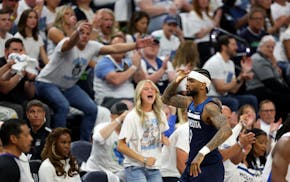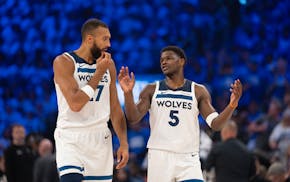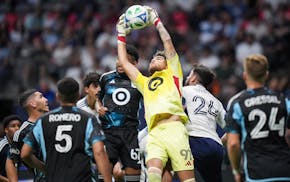The firing of the New York Mets general manager Jared Porter after little more than one month on the job brought strong responses about issues that women face while trying to do their jobs.
Porter, 41, who grew up in Wayzata, sent dozens of lewd text messages in 2016 to a female reporter. The story was reported by ESPN on Monday night and Porter was out of a job on Tuesday morning.
Here's some of what has been written and said:
Deesha Thosar, who covers the Mets for the New York Daily News, wrote: "Every interaction, no matter how casual, raises an unspoken question. What are his intentions? Is he just being nice? Is he expressing romantic interest in me? If he is interested in me, just how badly can this go? A large part of this job is a guessing game, particularly for women on a baseball beat, within an industry that is dependent on private texts and messages to gain information and, down the line, have a successful career.
"Working in a male-dominated industry has many layers, many of which are degrading, and it's immediately obvious how singularly unique some of these experiences are. As the only woman on the New York Mets beat, no other person is regularly around to understand the complex heartaches involved in being checked out or harassed when I'm just trying to do my job. In my fifth year working in baseball, I've lost count of how many sexist comments have been made directly to me while working. Many unacceptable situations that I would, at first, confront head-on as a fresh college graduate have begun to blend together and remain suppressed in fear of repercussions that could adversely impact my career. It can be a lonely place."
Read Thosar's entire column here.
Shalise Manza Young, who columnist for Yahoo Sports: "In sports media, we know that stepping forward could mean the loss of sources or having to leave a beat we've reported on for years, so you put up with a team general manager asking to go back to your hotel room with you, smiling and firmly telling him no and hoping it doesn't go any further. You reason with yourself — It wasn't really that bad, right? If you say something, then what? Do you want to endure the potential fallout? Are you ready to change jobs?
We come up with a script in approaching players and others to ask for their phone number, phone numbers we need to do our jobs: If something explosive happens during the closed part of practice, for example, you need people who were there to confirm and explain or deny the rumor. But a woman asking a man for his phone number, even for professional reasons, is awkward at best and rife with negative possibilities at worst, so you do your best to make it clear it's for work purposes.
All of it a minefield, but for many of us it's the only job we've ever wanted, so we adapt.
New York City talk radio host Maggie Gray answered a caller's question Tuesday. "The biggest battle you face is making sure people believe you."
Tyler Kepner of the New York Times talked to Molly Knight, a senior writer for The Athletic: "The truly disturbing part of this saga is how it graphically illustrates the garbage many women endure while working in and around baseball. 'It's so exhausting,' said the author Molly Knight, a senior writer for The Athletic who has covered baseball for 15 years. 'It's executives, it's players, it's P.R. people, it's writers. It's everywhere. It's the culture.'
The first time she interviewed a player, Knight said, he asked her repeatedly for the name of her hotel. Another time, she said, a Spanish-speaking player made sexually suggestive comments about her to a teammate, not knowing that she understood the language. Every woman in the business has similar stories and grapples with questions most male colleagues never have to consider.
Brittany Ghiroli of the Athletic wrote about what happened to her when she was covering the Baltimore Orioles: "In 2012, the Orioles were doing something completely unexpected: winning. Baltimore was, somewhat improbably, defying numbers and critics en route to the organization's first playoff berth in 15 years. The night before the wild card game, I was in my Texas hotel room when I got a text message from a player saying he had something to tell me, but didn't want to do it over the phone. I don't remember being worried about anything. This particular player, who is no longer in baseball, had helped me before with information about roster moves and sometimes told me about guys dealing with secret injuries. I got in my car that night and drove over to where the team was staying in Dallas. (I learned early on, a lot of problems can be avoided as a traveling female beat reporter if you stay in a separate hotel.) Possibilities raced through my head. Someone must be hurt. There's got to be some big roster move or pitching change.
I was 26 years old. I wasn't new anymore, but in my third year on the beat, I was still getting beaten to news by the other reporters most of the time. I couldn't believe I was going to get a scoop. On the eve of the biggest game for the Orioles in 15 years! We agreed to meet in the player's room, at his request, so others with the team wouldn't see us together in the lobby. It made sense — you have to protect your sources. There was no news. I walked in to candles lit and Drake playing. My stomach lurched as he came at me, trying to kiss me. I pushed him away and blurted out the only thing I could think of: What on earth would give him the idea that I was into him? I'll never forget the answer: 'Because you were nice to me.' "
Zack Britton, a pitcher on the 2012 Orioles, posted this:
Michael Rosenberg of Sports Illustrated had a historical perspective: "Two decades ago, Porter probably would have kept his job as Mets general manager. We can say this because two decades ago, Steve Phillips kept his job as Mets general manager. In 1998, a Mets employee described sexual harassment by Phillips. He acknowledged an affair with her. He took a leave of absence that lasted all of eight days and kept his job; the Mets' primary concern, at that time, seemed to be whether Phillips was OK. Phillips was eventually fired for baseball reasons, and he revived his professional life as a prominent broadcaster at ESPN until he was fired again, this time for sleeping with a production assistant. This week, reporting from Phillips's old network helped oust the GM of his old team."
Read the rest of Rosenberg's column here

Champlin Park shuts out Rogers 1-0 to win Class 4A, Section 5 softball title

Twins affiliate rained out more than any team: 'Never seen anything like this'

Three key Timberwolves players could enter free agent market

Souhan: If Edwards is a franchise player, he needs to act and play like it

